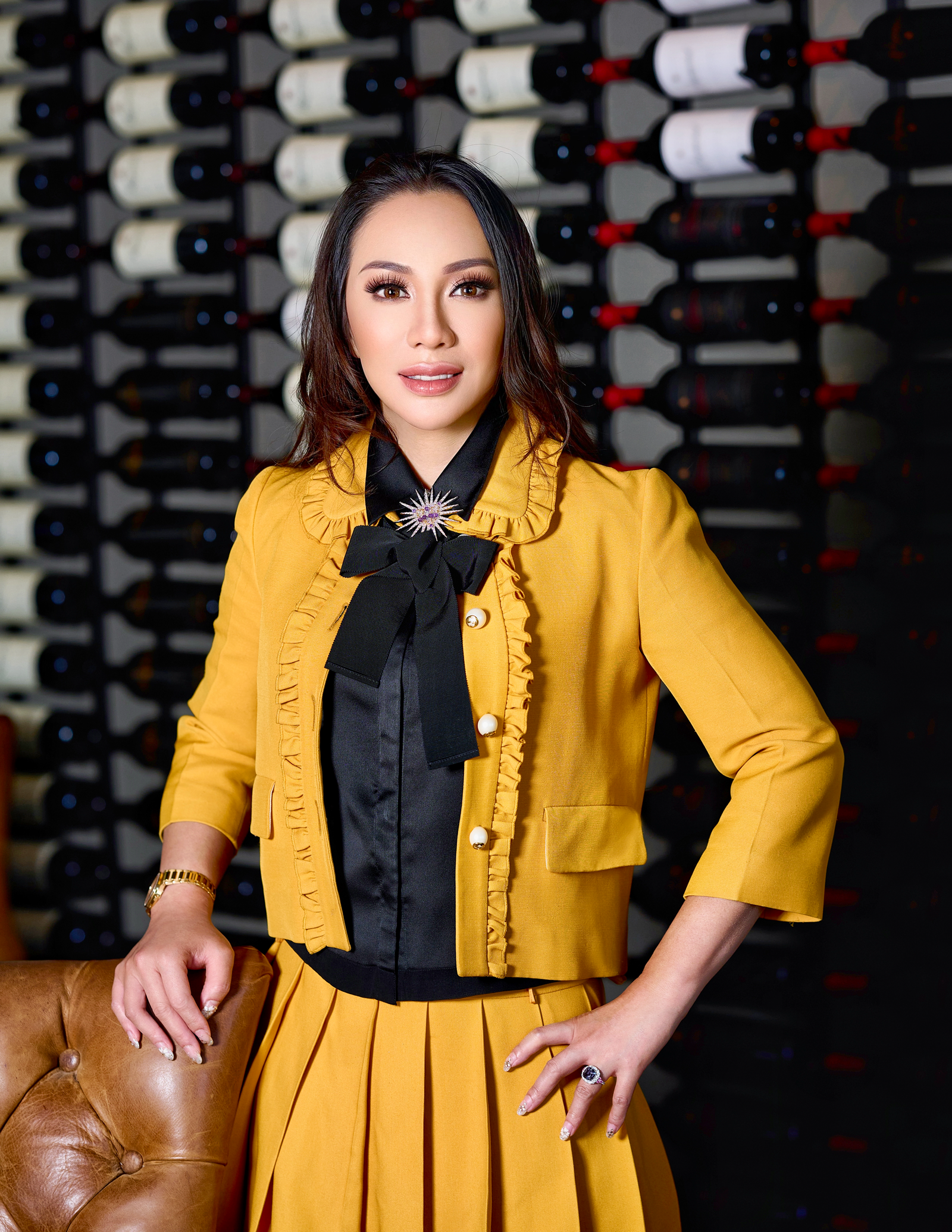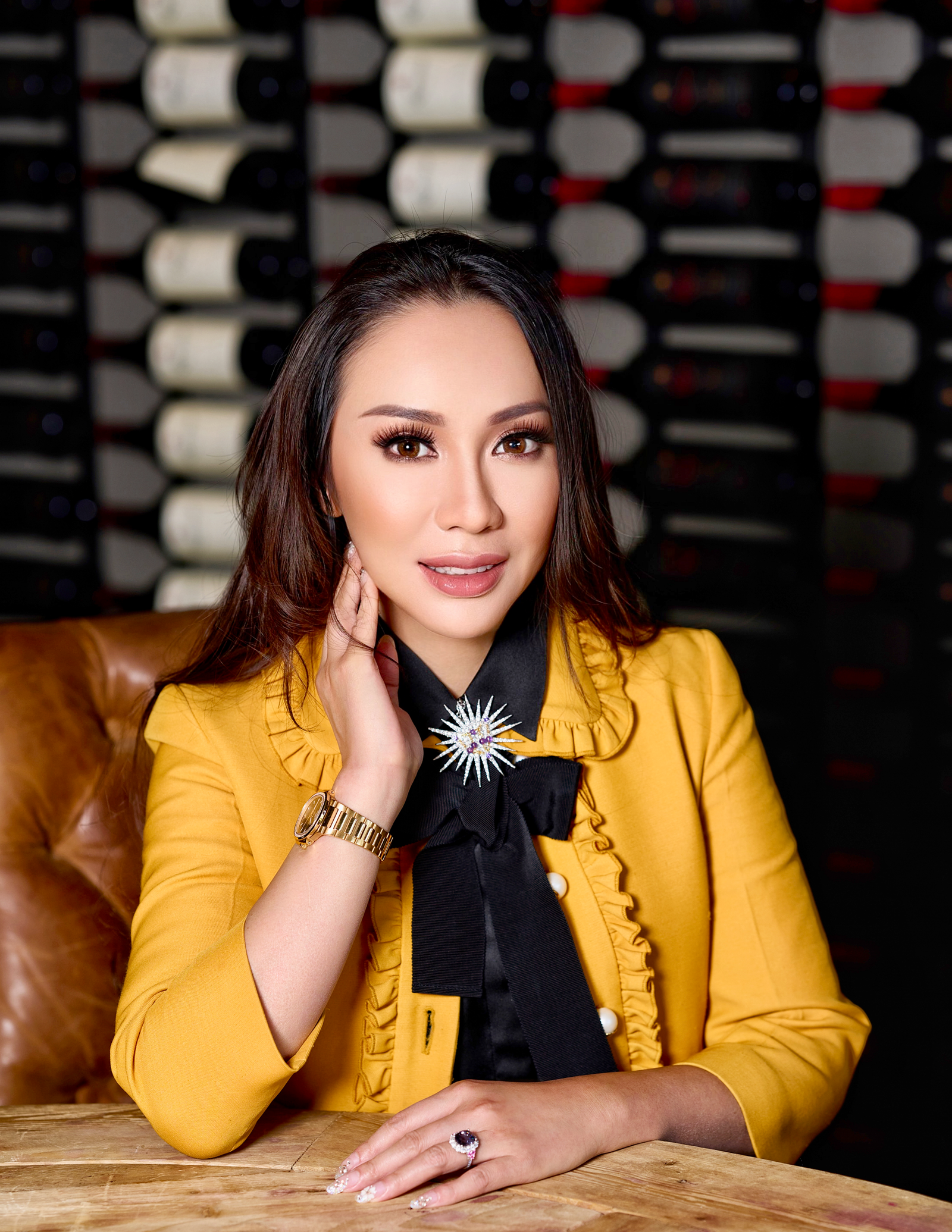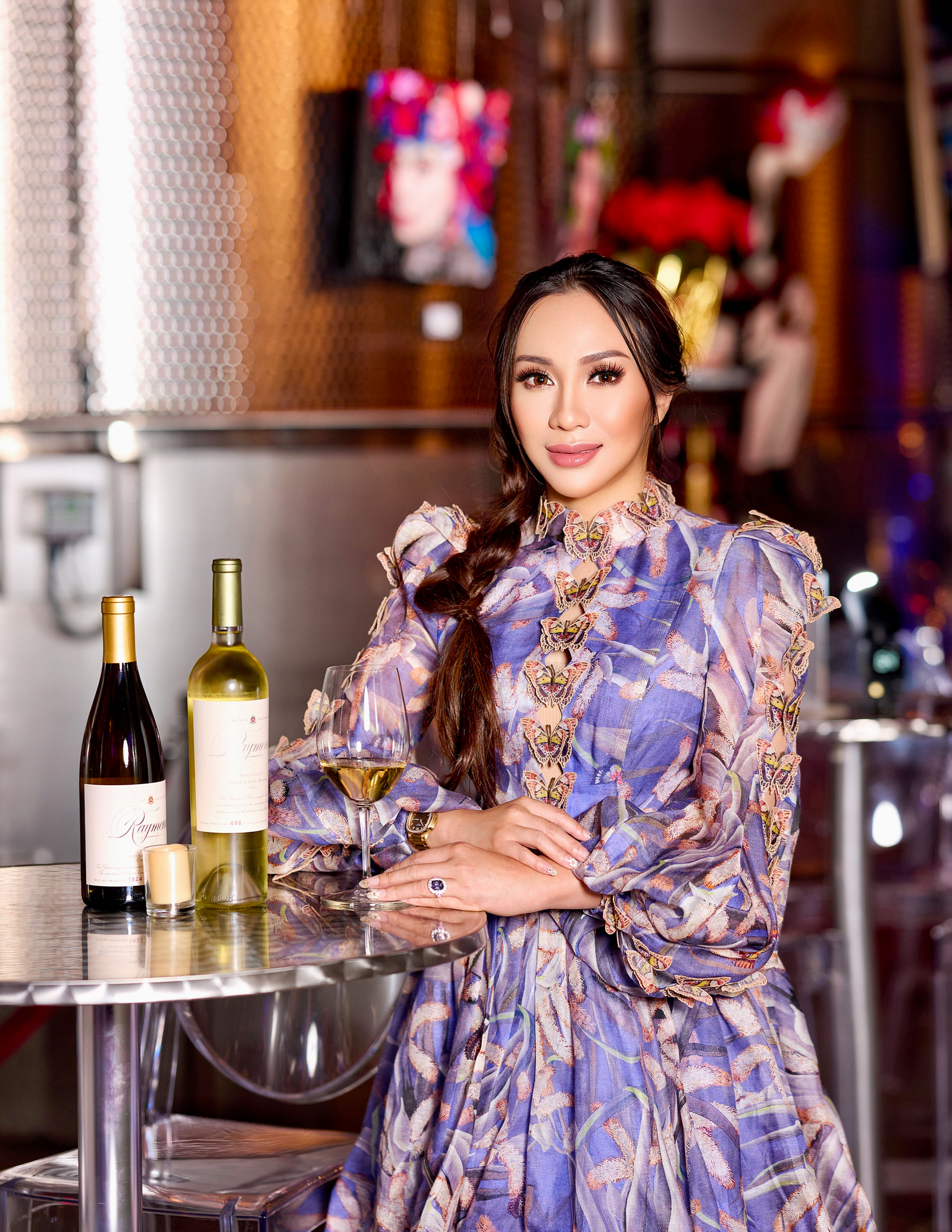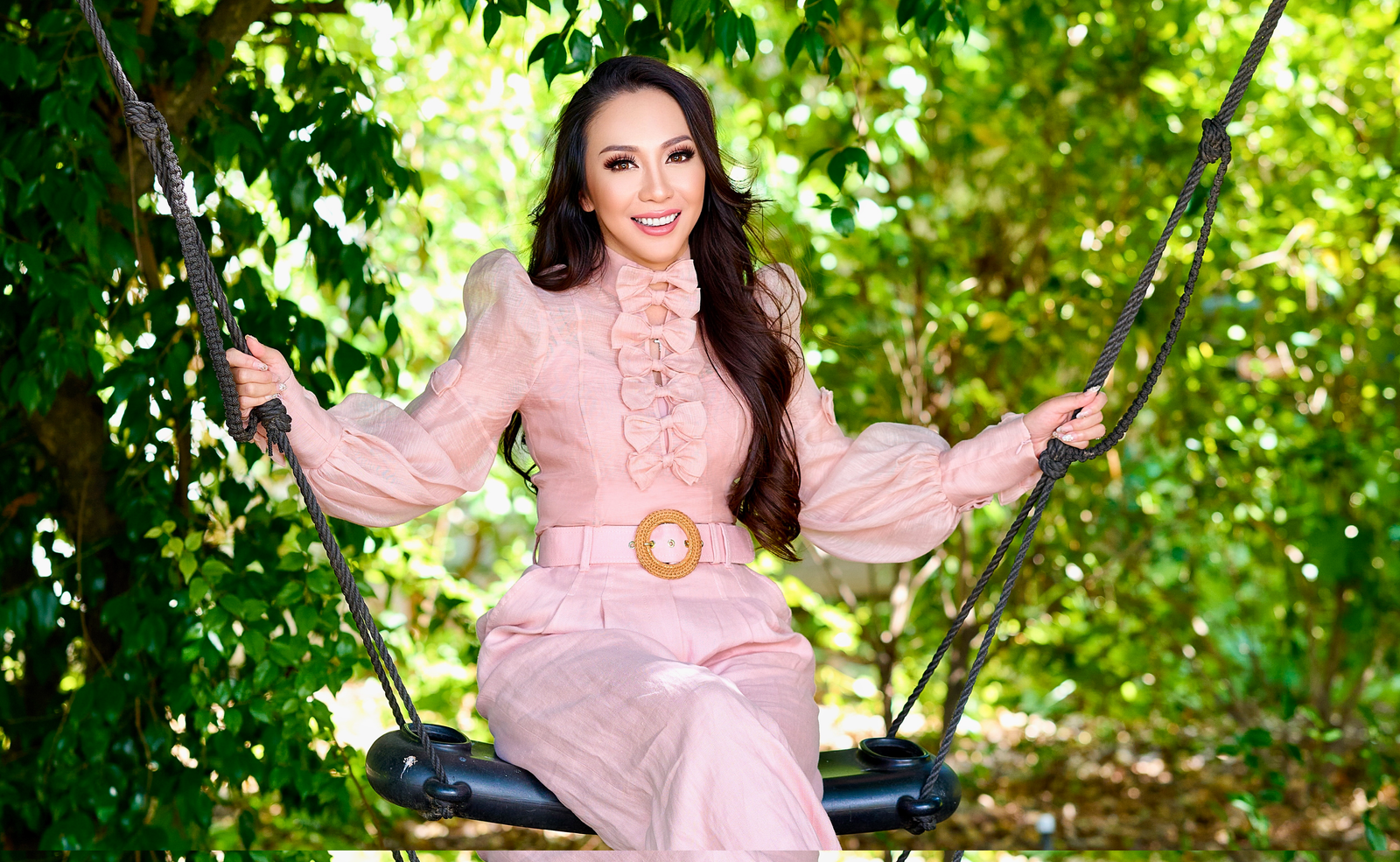Forged by Warriors and Matriarchs, Cindy Huang Conquers California
Author: Tanner Kelly
A petite frame, with traditional makeup and adorned in the height of Asian fashion, one might easily mistake Cindy Huang as someone’s trophy wife. Her success in business, academia, and uplifting others might even catch you off guard. Eminently polite, soft-spoken, and with an easy demeanor, Cindy puts everyone around her at ease. Her English is spoken slowly and through an accent, with an unassuming intelligence revealed in her choice of words.

Cindy meets me outside of the Equitable Building in Los Angeles’s Koreatown, an icon of Asian American success in California business. Perched on the 14th floor, with panoramic views of a sprawling Los Angeles, is one of Cindy’s latest ventures. A high-end co-working space with affordable rates, Ethos Society is Cindy’s brainchild to create a physical space from which to nurture budding entrepreneurs and connect them to each other to grow opportunities. Aptly named, Ethos Society’s mission embodies the very ethos of Cindy herself.
Cindy meets with me to reveal for the first time, for an English publication, the storied history of her family, where she comes from, the struggles she has faced, the memories that shaped her, and the ones that still haunt her.
If anyone’s family history and upbringing has influenced their trajectory and outlook on life, so too has Cindy’s.
BORN TO WARRIORS, BANKERS: A FATE IS FORMED
She swells with pride as she tells me about her family’s origins in China. Her maternal grandfather’s story begins humbly in the countryside–the same countryside that gave birth to the storied leader of the Chinese revolution, Chiang Kai Shek. A trusted friend to Chiang Kai Shek, her grandfather became his general, leading the fight with over 1,000 soldiers under his command.
Her paternal grandfather was the first-born son to a poor farming family. Without money for school, he would teach himself by sitting outside of the open window to a nearby classroom. His determination paid off, and he received a government scholarship to study in Japan, where he became the top student. He excelled on government exams and was appointed Minister of the Opium Control Bureau in China.
In what would become a legacy of strong women in the family, he found fortune when he married the youngest daughter to Vietnam’s wealthiest person at the time. With a large dowry, Cindy’s great grandfather sought to marry his daughter to the most intelligent man in China. Her grandfather received little pay from his government job to support a family, so Cindy’s grandmother began an international trading business in Chaozhou that she had learned from her father. She used the fortune she built in business to support the family and establish a bank, a rarity among women at the time–and a direct influence on Cindy’s own business success today.
“They had democratic beliefs, they were sensitive to their freedoms,” Cindy tells me. “My grandparents were very educated and overcame poverty to come up in the world.”
During the revolution, Cindy’s grandmother stayed home to take care of the four children and used earnings from her business to support the revolution and her husband’s career. While her grandfather was away on frequent meetings in Nanjing, the democratic capital at the time, he met an actress and took her as his concubine. She became pregnant at the same time as his wife.
During a government break when grandfather returned home, the actress followed him on a train. A humble woman, Cindy’s grandmother opened the door to find his pregnant mistress and could not take the sight. It is said that she was so heartbroken her health declined and she became horribly depressed. After giving birth, Cindy’s grandmother never recovered, and had no will to live any longer. Although extramarital affairs were typical of the time, it is believed the heartbreak cost her life, and she passed away before the revolution came to a close.
Yet, what Cindy learned from this piece of family history has left an indelible impact on her life, how she perceives the role of a woman, and the outer limits of what women can achieve. In her grandmother she sees a hard-working, smart, and beautiful woman who ran a business while being a loyal wife and giving 100% of herself–qualities Cindy mirrors closely, whether she would admit it or not.
Losing the revolution, both her mother and father’s side fled to Taiwan, leaving their fortunes behind in China. In Taiwan, her parents would eventually meet.

SHAPED BY LOSS, YEARNING: AN ETHOS BUILDS
Sensing that Taiwan was dying with nowhere for the opposition party to go, Cindy’s father thought the only opportunity to grow their family was to move to the United States and start a business. Cindy’s older sister was one year old when their father moved to New York City. “He carried nothing with him but a belief in freedom and opportunity in the U.S.,” asserts Cindy.
He wanted Cindy’s mother to stay in Taiwan until he stabilized life in New York. He opened a restaurant there, but also met another woman.
He did not do poorly in the beginning, and after three years went back to Taiwan, when Cindy was conceived and later born. At three months old, the plan was for her father to go back to the U.S. to settle down with her mother, sister, and Cindy, moving a few months after.
At first, he called once a month, and with every phone call he would tell Cindy that if she and her sister were good, he would come back. They were words that would haunt Cindy’s childhood. At age five or six, the phone calls became less frequent, until eventually there were none at all. He never did send for them and he would never be back.
Cindy recalls that her grandmother and nanny always told her she had a strong personality. She became an excellent student and from pre-school on she was always top of her class. “To show my father I was good, so he would come back,” Cindy remarks, fighting back tears. She ran track and competed in scholastic events, always outperforming her peers. Her sister was also a top performer in school.
“We knew we had to mature as soon as possible to be the most useful and strongest backup to our mom. Back in 1970 until the late ‘80s in Taiwan, there were a lot of discrepancies for working women in terms of salaries–inequality,” Cindy remembers. “Society did not accept divorced women. In the village everyone talked about how she did something wrong, otherwise her husband wouldn’t leave her. A lot of victim blaming. But my mother didn’t do anything, she was very good–subservient, traditional, working hard, honest, doing the right thing.” In her mother’s struggles, you can see the tenacity that has carried Cindy through life takes shape.
Her mother believed that education was the best opportunity to improve life. She dreamed of moving from the village to Taipei because of the higher living standard, but didn’t know how to afford it. She transferred her government job there, but without residency, she had no way of enrolling them in school. She found the best school district around her job site and visited a traditional breakfast restaurant, where she talked the owners into letting her use their address to register the kids for school.
For the next three years, Cindy, her sister, and her mom would commute two hours on the 5 a.m. train each day to work and to school.
Thinking of a way to make more money to afford a place to stay in Taipei, her mother would go to the jewelry market to select stones to design jewelry. She had good taste and wealthy women would come to look at her pieces on the weekends. Soon, she had a modestly successful business and was making enough income to afford a one-bedroom apartment in Taipei.
One day when Cindy was 11 years old, her mother brought her and her sister to McDonald’s–a luxury for them–and made a declaration. “I will not wait for your dad anymore, I am confident, I will find you a good father that will take care of you,” she said.

SAVED BY LOVE, LEARNING: A FUTURE IS FORGED
Her mother joined a matchmaker club and after about two years, found a reliable guy, Henry Yang, who Cindy now calls her father.
At this, Cindy becomes emotional. Tears stream down her eyes and she stares down, silence punctuating our conversation. “For the first time, I didn’t have to be the strongest in the family. He would take care of us. I felt relief from a tough life but I was sad there was no hope of being reunited with my biological dad,” she recalls. “Everyone has to move on.”
From 12 to 18, Cindy was busy studying. She never attended a party until she was 21 years old. Her effort in school was rewarded and she was admitted to National Taiwan University where she studied economics and geography.
She warned her mother, “I don’t want to be a businessman, people only focused on money are totally wasting their lives. The three jobs I won’t touch are business, banking, or anything to do with finance. And I will never speak English.” She would later laugh at the irony.
At college she began a relationship with a boy, Eric, whom she had met in high school, a rising engineering student and the only student better at math than her. After college, he was admitted to University of Southern California for a Ph.D. program. Compelled by love, Cindy begrudgingly made the move with him to the United States in 2004 at the age of 27.
Struggling financially on a grad student’s stipend, Cindy goes to work, of all places, at a small bank run by her cousin. She worked as a cashier for six months, still not making enough money to afford a place for her and Eric to live alone. She eventually convinced her cousin to give her a promotion as head of the mortgage division at the bank, a small part of the business earning no profit at the time.
In only a year, Cindy transformed the department and made it the bank’s most profitable business by administering a first-time homebuyer program and gaining government credits. At one community outreach event, Citibank took notice and offered her a job as a mortgage consultant with increased pay and benefits that Cindy says she couldn’t refuse.
Cindy credits Citibank with opening a whole new chapter in her life. After two years, she was top three in mortgage sales across the nation. Cindy survived layoffs during the mortgage crisis and from 2008 to 2012, covered 12 branches for mortgage services.
The market started changing in 2011 as the Chinese economy was improving. “Chinese immigrants came with money. We call it a Chinese immigration wave from 2011 until 2016. Chinese people liked buying properties, but they came brand new without credit—on a green card,” she explains. “Citibank wouldn’t do foreign loans with no credit history. HSBC was the biggest one offering that to foreign nationals and new immigrants.” She was recruited there as a loan officer based in the San Gabriel Valley, where she excelled at working with low-income minority communities on the first-time homebuyer program.
“This program was so important to balancing my heart. Making money from rich people is one thing but helping people who need it is a whole other,” says Cindy. “It was a key component to supporting my energy to keep doing my job. I was making so much money from rich people, my soul felt dry. I needed a balance.”

INSPIRED BY COMPASSION, CARING: A CALLING CRYSTALLIZES
During the mortgage crisis, Cindy saw a lot of banks failing. Around 2011, Cindy began thinking that if she had a bank, she would do it differently. “So I wanted my own bank,” Cindy states casually.
Beginning in 2012, she worked during the day as a mortgage consultant at HSBC and at night started a venture capital (VC) fund. Her first VC investment was SpaceX and she started investing into a lot of high-tech companies. She began looking into financial technology (FinTech) as well, because, “I know eventually banks will transform from manual to digital,” she states.
She left HSBC in 2017 to do VC and investment banking full time. Her investments were doing well and she needed more time for herself as she was seriously considering her own bank.
Today, Cindy is in the process of acquiring a bank. “I am very close to my dream. I will be able to implement the FinTech I’ve been incubating for a long time,” she says through a smile.
“My goal with the bank, after we implement all the FinTech we have, is to be able to save 60% manpower and lower the risk by 80% because artificial intelligence monitors the risk pretty well. Highly effective digital banking is my goal,” Cindy says as she turns business.
Cindy is today considered an angel investor, having invested in over 50 companies in their earliest stages. 18 of those investments have successfully reached profitability heading to pre-initial public offering (IPO) stage and three of the 18 are currently in IPO stage. 32 of the 50 failed. “There are no big mistakes, everything that failed, failed for a reason. When they failed, it was because I didn’t check the details or do the due diligence, some component of success was missing. I learned from every investment,” she said.
Her biological father passed away in 2014. She stayed in touch with him while in the U.S. and saw him once a year or every other year until he passed. They never did become close. “We had the tallest divide between us. In my heart there is still a question mark. Why he never thought to come back to Taiwan even once? Maybe I’m afraid of the answer, because if the answer is not so important I will probably feel more sorrow about my life,” Cindy says.
With no kids of her own, Cindy has three dogs she treats as children: Junior, PomPom, and Jumei. Her husband has his own start-up, making battery systems for military drones. Besides her bank, investing in a plastic surgery group has been her favorite investment. “Whenever I have time, I go and try all the machines and learn the new skills for cosmetic plastic surgeons,” Cindy beamed.
Looking back on the incredible journey that has brought her to this moment, Cindy reflects, “I feel like my life was lived in reverse. I was very much an adult when I was a child. I grew up with a tough life and it got better and better and better. I couldn’t afford to be naive as a child. Now, I can afford to have fun and take risks, and I always appreciate and deeply believe my life is a miracle from God.”
This is the Cindy that most people know today.

CINDY HUANG @cindy.y.huang
Writer: TANNER KELLY
HMUA: ETHEL MH REDDY @e.the.look
Fashion Stylist: MONIQUE ZHANG @moniquezhang
Copy Editor: KIEDO VILLANUEVA @kie_villanueva
Photographer’s Assistant: TRIFON ELDRIN BAJARIAS @trifoneldrin
Art Director: NIGEL JOHN DEL MUNDO @nigeldelmundo
Photographer: VINCENT GOTTI @vinniegotti
Location: RAYMOND VINEYARDS @raymondvineyard

